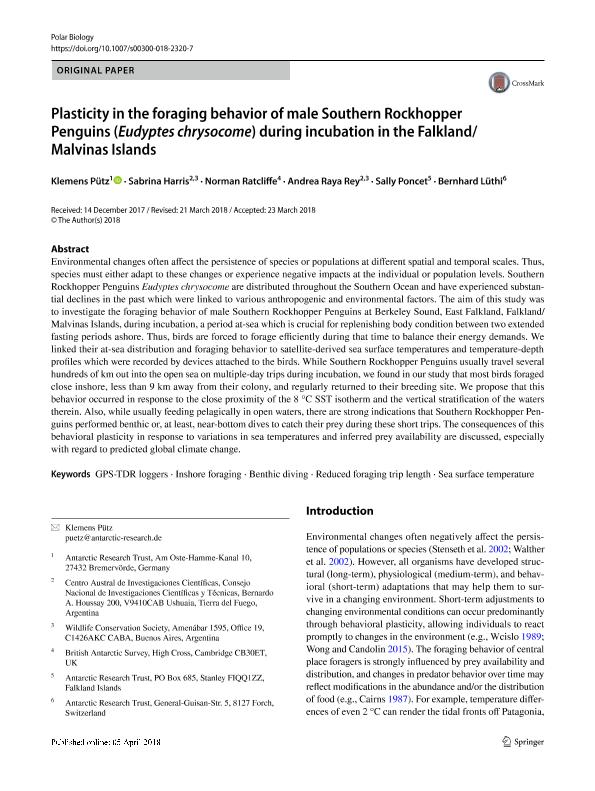Mostrar el registro sencillo del ítem
dc.contributor.author
Pütz, Klemens
dc.contributor.author
Harris, Sabrina

dc.contributor.author
Ratcliffe, Norman
dc.contributor.author
Raya Rey, Andrea Nélida

dc.contributor.author
Poncet, Sally
dc.contributor.author
Lüthi, Bernhard
dc.date.available
2020-01-14T19:13:36Z
dc.date.issued
2018-09
dc.identifier.citation
Pütz, Klemens; Harris, Sabrina; Ratcliffe, Norman; Raya Rey, Andrea Nélida; Poncet, Sally; et al.; Plasticity in the foraging behavior of male Southern Rockhopper Penguins (Eudyptes chrysocome) during incubation in the Falkland/Malvinas Islands; Springer; Polar Biology; 41; 9; 9-2018; 1801-1814
dc.identifier.issn
0722-4060
dc.identifier.uri
http://hdl.handle.net/11336/94660
dc.description.abstract
Environmental changes often affect the persistence of species or populations at different spatial and temporal scales. Thus, species must either adapt to these changes or experience negative impacts at the individual or population levels. Southern Rockhopper Penguins Eudyptes chrysocome are distributed throughout the Southern Ocean and have experienced substantial declines in the past which were linked to various anthropogenic and environmental factors. The aim of this study was to investigate the foraging behavior of male Southern Rockhopper Penguins at Berkeley Sound, East Falkland, Falkland/Malvinas Islands, during incubation, a period at-sea which is crucial for replenishing body condition between two extended fasting periods ashore. Thus, birds are forced to forage efficiently during that time to balance their energy demands. We linked their at-sea distribution and foraging behavior to satellite-derived sea surface temperatures and temperature-depth profiles which were recorded by devices attached to the birds. While Southern Rockhopper Penguins usually travel several hundreds of km out into the open sea on multiple-day trips during incubation, we found in our study that most birds foraged close inshore, less than 9 km away from their colony, and regularly returned to their breeding site. We propose that this behavior occurred in response to the close proximity of the 8 °C SST isotherm and the vertical stratification of the waters therein. Also, while usually feeding pelagically in open waters, there are strong indications that Southern Rockhopper Penguins performed benthic or, at least, near-bottom dives to catch their prey during these short trips. The consequences of this behavioral plasticity in response to variations in sea temperatures and inferred prey availability are discussed, especially with regard to predicted global climate change.
dc.format
application/pdf
dc.language.iso
eng
dc.publisher
Springer

dc.rights
info:eu-repo/semantics/openAccess
dc.rights.uri
https://creativecommons.org/licenses/by-nc-sa/2.5/ar/
dc.subject
BENTHIC DIVING
dc.subject
GPS-TDR LOGGERS
dc.subject
INSHORE FORAGING
dc.subject
REDUCED FORAGING TRIP LENGTH
dc.subject
SEA SURFACE TEMPERATURE
dc.subject.classification
Biología Marina, Limnología

dc.subject.classification
Ciencias Biológicas

dc.subject.classification
CIENCIAS NATURALES Y EXACTAS

dc.title
Plasticity in the foraging behavior of male Southern Rockhopper Penguins (Eudyptes chrysocome) during incubation in the Falkland/Malvinas Islands
dc.type
info:eu-repo/semantics/article
dc.type
info:ar-repo/semantics/artículo
dc.type
info:eu-repo/semantics/publishedVersion
dc.date.updated
2019-10-17T14:04:13Z
dc.journal.volume
41
dc.journal.number
9
dc.journal.pagination
1801-1814
dc.journal.pais
Alemania

dc.journal.ciudad
Berlin
dc.description.fil
Fil: Pütz, Klemens. Antarctic Research Trust; Alemania
dc.description.fil
Fil: Harris, Sabrina. Consejo Nacional de Investigaciones Científicas y Técnicas. Centro Austral de Investigaciones Científicas; Argentina. Wildlife Conservation Society; Estados Unidos
dc.description.fil
Fil: Ratcliffe, Norman. British Antartic Survey; Reino Unido
dc.description.fil
Fil: Raya Rey, Andrea Nélida. Consejo Nacional de Investigaciones Científicas y Técnicas. Centro Austral de Investigaciones Científicas; Argentina. Antarctic Research Trust; Alemania
dc.description.fil
Fil: Poncet, Sally. Antarctic Research Trust; Alemania
dc.description.fil
Fil: Lüthi, Bernhard. Antarctic Research Trust; Alemania
dc.journal.title
Polar Biology

dc.relation.alternativeid
info:eu-repo/semantics/altIdentifier/doi/https://doi.org/10.1007/s00300-018-2320-7
dc.relation.alternativeid
info:eu-repo/semantics/altIdentifier/url/https://link.springer.com/article/10.1007%2Fs00300-018-2320-7
Archivos asociados
